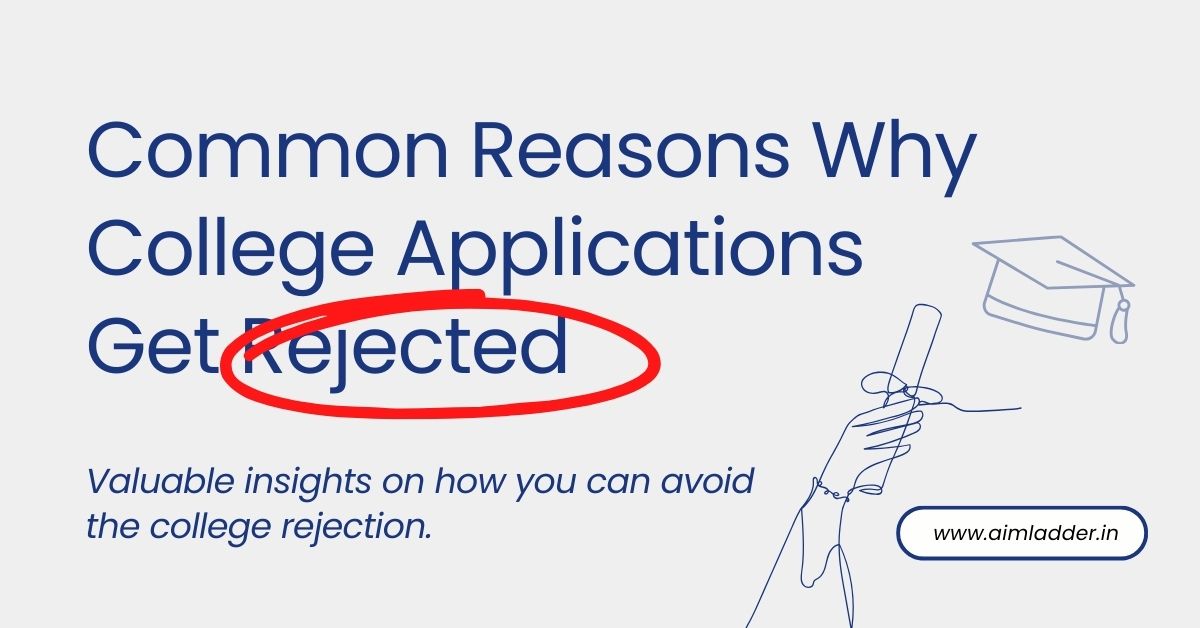- Services
-
-
Test Preparation
-
Study Abroad Services
Visitor, Tourist & Dependent Visas
-
-
-
- Study Destinations
-
-
Top Study Destinations
-
-
-
-
- About Us
- Contact Us
- Blog
Common Reasons Why College Applications Get Rejected

Page Content
- The Top Reasons College Applications Are Denied
- #1 Failure to meet the High GPA or Test Score Criteria
- #2 Statements of Purpose/Personal Statements not being up to the mark
- #3 Lack of Engagement in Extracurricular Activities
- #4 Late Application Submission
- #5 Inadequate Recommendation Letters
- #6 Mismatch with the College’s Culture and Programs
- #7 Neglecting Supplementary Application Materials
- #8 Issues with Plagiarism or Honesty
- #9 Competition
- 10 Tips to Avoid College Rejections
- Conclusion
The college application journey is a blend of excitement and anticipation, but it can also be a bit challenging for some. Being mindful of common reasons why college applications get rejected is extremely vital. Recognizing these factors is the first step toward avoiding them and enhancing your chances of securing a spot at your dream institution. In this blog post, we’ll delve into the prevalent reasons behind college application rejections and provide valuable insights on how you can avoid them.
The Top Reasons College Applications Are Denied
Discover the top 9 reasons why aspiring students often face disappointment in their pursuit of higher education. Gain insights and valuable tips on how to avoid these common pitfalls and increase your chances of securing admission to your dream college.
#1 Failure to meet the High GPA or Test Score Criteria
A significant factor leading to college application rejection is not being eligible, academically. High school grades, your choice of courses, and your performance in admission-specific tests carry substantial weight in the admissions process. Academic scores serve as the primary indicator of a student’s aptitude and potential for success in higher education which makes it a crucial component of the application process. If your academic track record doesn’t meet the institution’s standards, it could result in your application being turned down. You can avoid this by making sure you pay attention to your coursework, seeking assistance when necessary, and preparing for standardized tests.
#2 Statements of Purpose/Personal Statements not being up to the mark
Your statement of purpose or personal statement serves as your canvas to paint a picture of your personality, life experiences, and dreams. It plays a pivotal role in the admissions process, often being the first document reviewed by the admissions committee. The most common mistake is presenting copied from the internet or poorly crafted generic SOPs that don’t capture your true essence. Consider crafting engaging narratives that not only demonstrate your character but also demonstrate your compatibility with the college’s culture. You should know how to write statement of purpose. Don’t hesitate to seek guidance and feedback from educators, counsellors, or peers to fortify the strength of your SOP.
#3 Lack of Engagement in Extracurricular Activities
In order to gain admission to college, students should be well-rounded, be involved in extracurricular activities, perform community service, and have leadership qualities. For some institutions, it can be a red flag for admissions committees if your extracurricular list is sparse or unimpressive. You can avoid this by joining clubs, or sports teams, volunteering, or holding leadership positions that align with your interests.
#4 Late Application Submission
The admissions committee is often swamped with applications and operates on a tight schedule. Since many institutions work on a “first come, first served” basis, it’s important to submit your application promptly with all the required materials, such as transcripts and recommendations.
#5 Inadequate Recommendation Letters
When it comes to academic and professional contexts, getting a generic letter of recommendation can hurt your application. You need someone who knows you well, so they can articulate specific and positive aspects of your character and skills. Developing a positive relationship with your recommenders can help them write more compelling and convincing letters, which can make a big difference in your academic and professional life.
#6 Mismatch with the College’s Culture and Programs
A common mistake is choosing a college that does not match your academic and personal goals. There are strengths and atmospheres at every college. It’s important to be picky and apply to colleges that match your dreams and principles. Customize your application to show why you’re a great match for that particular college.
#7 Neglecting Supplementary Application Materials
Some colleges require supplementary materials beyond the regular application, such as art portfolios or major-specific interviews. Neglecting to provide these additional materials when they are requested may lead to rejection. For instance, underperforming in an admission interview due to inadequate preparation can hinder your chances of being accepted by your desired institution. It’s important to review and follow each college’s unique application requirements meticulously.
#8 Issues with Plagiarism or Honesty
A plagiarism or dishonest application can get you rejected and damage your academic and personal standing. Therefore, it’s essential to be truthful, genuine, and unique in all parts of your application.
#9 Competition
College admissions are often fiercely competitive, which sometimes leads to the rejection of well-qualified students’ applications. There are a limited number of seats available at renowned institutions, resulting in a surge of applications from highly talented and motivated students. Therefore, getting admission becomes extremely challenging.
10 Tips to Avoid College Rejections
Here are the 10 expert tips to enhance your application, make a lasting impression, avoid college rejections and increase your chances of securing admission to your desired college.
#1 Begin Your Journey Early:
Success in college admissions begins with an early start. Begin your journey by researching colleges, delving into programs, and setting academic goals as soon as you can. A head start grants you the time needed to collect all the necessary materials, polish your application, and meet those important deadlines.
#2 Excel in Your Studies:
Your academic record, which includes your high school grades and test scores, plays a vital role in college admissions. It’s important to aim for a solid GPA and, if needed, don’t hesitate to seek help with test preparation. Building a strong academic foundation is the initial step in your journey toward securing a college spot.
#3 Write an Impressive/Informative Statement Of Purpose:
Statements of purpose are great platforms for expressing who you are. This is an opportunity to tell your story, giving insights into your character, your life experiences, and your aspirations. To maximize the impact of your statement, consider integrating specific anecdotes that exemplify your qualities and ambitions. Moreover, don’t hesitate to reach out to educators, mentors, or peers for guidance and feedback as you craft your essays. Their insights can help you fine-tune your writing and ensure that your statement of purpose is a compelling reflection of your identity and goals.
#4 Embrace Activities Outside of Class:
Colleges appreciate students who are involved in various activities, community service, and leadership roles. Devote your time to clubs, sports, volunteer work, or roles that match your interests. Being engaged in these activities sets you apart in a positive way.
#5 Stay Mindful of Deadlines:
Overlooking application deadlines is a frequent error, but one that can be easily avoided. Admissions committees stick to their schedules closely. To make sure your application gets the attention it deserves, be diligent in submitting all the required materials on time.
#6 Gather Strong Recommendations:
Recommendation letters hold sway in your application. Foster meaningful connections with your recommenders, so they can craft persuasive, detailed, and positive letters that genuinely reflect your character and capabilities.
#7 Find the Perfect Match:
Apply to colleges that match your academic and personal goals. Research each institution’s strengths, culture, and values to ensure it’s a perfect fit. Tailor your application to illustrate why you are a great match.
#8 Mind the Details:
Colleges may require supplementary materials, such as portfolios or interviews for specific majors. Carefully read each college’s application requirements and ensure all materials are submitted as requested.
#9 Be Honest and Unique:
Maintain authenticity and honesty throughout your application. Plagiarism and dishonesty can have severe consequences. Be original and genuine in all aspects of your application.
#10 Seek Guidance:
Don’t be afraid to talk to teachers, counsellors, college admissions professionals, and even study abroad consultants. They can provide invaluable perspectives and help throughout your academic journey with their wisdom and expertise. It’s a good idea to talk to study abroad consultants, in particular, as they have specialized knowledge in international education and can provide tailored advice to boost your admission chances.
Conclusion
You’ll be more confident and have a greater chance of success if you know these typical stumbling blocks. Make sure your academic and personal materials reflect your interests and aspirations, stay organized, and make good choices. It’s easier to get that coveted acceptance letter from your dream college if you avoid the usual rejection reasons.
Book A Free Consultation
Our counselors guide you in every step of studying abroad, from selecting the right country, university, and course to test preparation.




